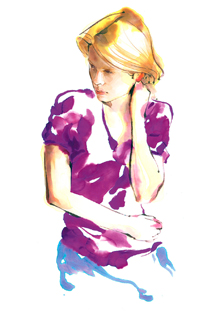
Illustration: Kagan McLeod
Mehmet Oz, MD, host of The Dr. Oz Show, analyzes the different treatments for frequent headaches.
The feeling is familiar: a band cinching your skull, a dull ache in the back of your neck. It's a tension headache, and it's by far the most common type—about 90 percent of women and 70 percent of men will experience one during their lifetime. Neurologists don't completely understand the reason your head hurts, but they do know that many headaches are linked to stress, contraction of the neck muscles, poor sleep, and, in women, monthly hormonal fluctuations. Which is why most headache experts recommend relaxation techniques, exercise, limiting caffeine and alcohol (which interfere with sleep), and, for women, discussing birth control pills with a gynecologist. Here, four approaches to treating headaches.Neurology
The first thing a neurologist would do is order a CT scan or MRI to rule out potentially serious causes such as a tumor, aneurysm, or stroke, says Marc Sharfman, MD, director of the Headache and Neurological Treatment Institute in Longwood, Florida. If those are ruled out, then, besides the nondrug treatments above, Sharfman might suggest biofeedback: He connects patients to devices that monitor muscle tension, blood pressure, and heart rate, then has them practice breathing patterns to identify what helps them relax. Drugs—over-the-counter and prescription—are part of a neurologist's arsenal, but Sharfman notes that patients do best by combining nondrug approaches with minimal medication use.
Acupuncture
A primary goal for an acupuncturist is to wean the patient off prescription and over-the-counter painkillers that can trigger rebound headaches (people who regularly take these medications can suffer a headache as soon as the pills wear off), says Daniel Hsu, a practitioner of traditional Chinese medicine and founder of New York AcuHealth, an acupuncture clinic. Acupuncture can help patients relax as well as transition off medications; what's more, a recent review of research found that the technique could halve the number of days a month a person experiences head pain.
Homeopathy
Along with prescribing a remedy for the headache, a homeopath will typically offer advice on improving diet or, say, reducing exposure to chemicals in the environment, says Dana Ullman, who runs Homeopathic Educational Services in Berkeley. Because homeopaths believe the body's response to an illness is the correct one, they give heavily diluted substances—often the herbs nux vomica and belladonna for headaches—that are supposed to mimic the patient's symptoms, thereby helping the body defend and heal itself. (Though these two herbs are poisonous, the doses contain no toxins.) Often, the patient can begin to feel much better after one treatment, Ullman says.
Nutrition
Alexander Mauskop, MD, director of the New York Headache Center, has performed numerous studies on the interplay of nutrients and headaches, and has found that many sufferers are low in key nutrients—primarily magnesium, coenzyme Q10, riboflavin, and vitamin D. "Up to 50 percent of headache sufferers can be magnesium deficient," he says. Magnesium can ease muscle spasms and alter brain chemicals thought to play a role in headaches; what the other nutrients do is less clear. Mauskop uses sophisticated blood tests to measure nutrient levels. (For more on testing mineral levels, see The Truth About Mineral Supplements .) But if a patient doesn't eat plenty of fruits and vegetables, is under a lot of stress, or is a frequent drinker, Mauskop might prescribe supplements without testing. "All these things can reduce nutrient levels," he says.
My Recommendation
Acupuncture and homeopathy are worth considering as adjunct therapies once you are sure that the headache is not a sign of a serious disorder. Like Alexander Mauskop, I believe that magnesium can help—it relaxes arteries and muscles in the body, both of which can help with headaches.
Exercise helps, too—and yoga is a great choice since it can also help you unwind. Biofeedback is useful; in headache research, it has proven its worth. As far as medications go, I prefer ibuprofen and aspirin. And although no one mentioned this, lavender or sandalwood aromatherapy can help you relax. Just take a dab of the oil and rub it into your temples.
Read another column by Dr. Oz: 4 treatments for low back pain
Dr. Oz is the host of The Dr. Oz Show (check local listings).
As a reminder, always consult your doctor for medical advice and treatment before starting any program.




